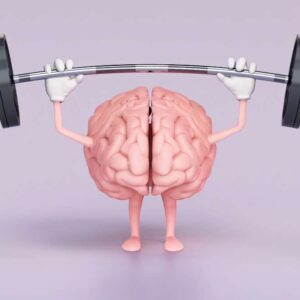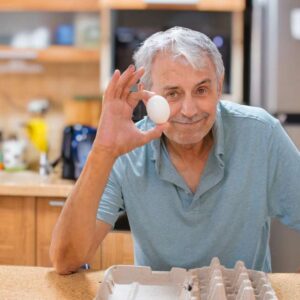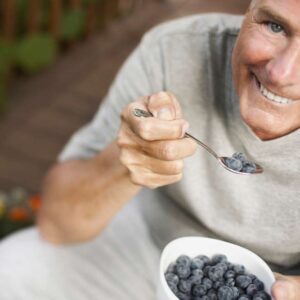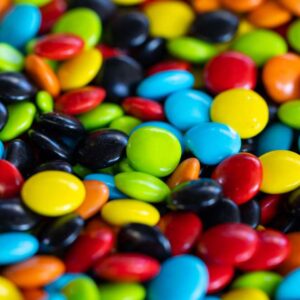
Strokes CAN Strike Twice—This Simple Fix Cuts Your Risk 20%
They say lightning never strikes twice in the same place.
But that old adage couldn’t be further from the truth when it comes to strokes.
If you’ve had a stroke, you might think you’re out of the woods once you recover.
But the reality is far different…
A comprehensive study published in JAMA revealed the risk of having another stroke is 5.9 percent in the first year, 12.8 percent within five years, and a whopping 19.8 percent within 10 years.
In other words, nearly one in five stroke survivors will face another within a decade.
The reason why is really quite simple. Often, the same risk factors that caused the first stroke remain in play after recovery.
Think of it like patching a leaky faucet but ignoring the rusty pipes—you’re treating the symptom, not the cause.
Many folks breathe a sigh of relief after surviving a stroke, especially a minor one, and go right back to their pre-stroke habits.
But that initial stroke is your body waving a giant red flag—signaling that something needs to change.
The good news is Mother Nature has provided us with plenty of ways to naturally reduce stroke risk.
Here are some powerful solutions that don’t require a prescription:
- Move that body! Regular physical activity helps control blood pressure, weight, and cholesterol—all major stroke risk factors. Even a daily 30-minute walk can make a significant difference.
- Embrace the Mediterranean diet. This diet, loaded with fruits, vegetables, whole grains, olive oil, and fish, reduces stroke risk by up to 20 percent.
- Cut the salt, not the flavor. Excess sodium can send your blood pressure soaring. Instead of reaching for the salt shaker, try herbs, spices, and citrus for flavor.
- Quit smoking… yesterday. Smoking doubles your stroke risk. And yes, that includes vaping too!
- Stress less. Chronic stress contributes to inflammation and high blood pressure. Try meditation, deep breathing, or yoga to keep your stress hormones in check.
- Sleep soundly. Poor sleep is linked to higher stroke risk. Aim for seven to eight hours of quality shut-eye each night.
- Know your numbers. Regular check-ups to monitor blood pressure, cholesterol, and blood sugar can help catch problems before they lead to a stroke.
- Moderate the alcohol. That glass of red wine might be good for your heart in small amounts, but excessive drinking increases stroke risk substantially.
Remember, preventing a second stroke isn’t just about dodging a bullet—it’s about embracing a lifestyle that boosts your entire quality of life.
So, if you or someone you love has experienced a stroke, consider it a wake-up call. While lightning might not strike twice in the same place, strokes, unfortunately, do.
However, implementing these natural solutions can significantly improve your odds of keeping that second stroke at bay.
P.S. Could common bacteria DOUBLE your stroke risk?
Source:
Writing Committee for the PERSIST Collaborators. Long-Term Risk of Stroke After Transient Ischemic Attack or Minor Stroke: A Systematic Review and Meta-Analysis. JAMA. Published online March 26, 2025. doi:10.1001/jama.2025.2033
Written By Dr. Scott Olson, ND
Nearly 25 years ago, failed mainstream medical treatments left Dr. Olson in constant pain – and his health in ruins. And that’s when he did something REVOLUTIONARY. He began his career in medicine – and dedicated his life to uncovering the true, underlying causes of disease.
Through his innovative medical practices in Tennessee and Colorado, Dr. Olson has helped cure countless seniors from across America of arthritis… heart disease… diabetes… and even cancer. All without risky prescription drugs or painful surgeries.
View More Free Articles
Get Intermittent Fasting Benefits Without Going Hungry
Intermittent fasting, which involves cycling between eating and fasting periods, is effective. There’s plenty of evidence for that. It’s not just weight loss, either. Intermittent fasting has significant benefits for metabolic health. However, many people find fasting difficult to stick to—and others can’t do it at all due to medical issues—so they miss out on...
Just Diagnosed with Hypertension? —6 Things to Do Next
You’ve been diagnosed with high blood pressure—now what? First, take a breath. You’re not alone—over 30 percent of adults worldwide have hypertension. That makes it one of the most common health issues… and a top cause of preventable deaths. The good news is that, unlike some conditions that can leave you feeling helpless, high blood...
Brain Games Are USELESS—Do These 5 Things Instead
I’ve seen a lot of lists lately claiming to have the secrets that keep your brain from turning into mush as you age. They typically advise activities such as doing crosswords, learning Spanish, or taking up the accordion. Challenging your mind with new learning experiences is definitely a great way to keep your brain engaged...
This $5 Fix REVERSES Cellular Aging in Just 6 Months
You take your vitamins, eat your vegetables, and feel healthy—so your nutrition is covered… right? Well, new research suggests that even health-conscious older adults may be missing crucial nutrients that keep their cells functioning like those of younger people. The trouble is that as we age, our bodies become less efficient at absorbing nutrients from...
Mailbag: Doctors Get Bone Health WRONG—Here's What Really Works
“Thank you so much for answering this. With millions of women who are seniors over 70 facing a diagnosis of osteoporosis, this is my question. What can we do naturally to help improve our bone density, especially in the spine lumber 1 and 2? Also, how do we help improve bone density in the femur...
Critical Brain Nutrient Missing In 9 Out of 10 American Diets
You’ve probably heard plenty about brain-boosting omega-3s, antioxidants, and B vitamins. But there’s another nutrient that’s just as critical for your cognitive health. However, it’s been flying under the radar… until now. Mounting evidence suggests this overlooked compound could be key to protecting your brain and enhancing memory. It may even reduce your risk of...
"Miracle Berry" Supercharges Your Microbiome
Happy Father’s Day to all the dads and granddads who’ve shared their wisdom, strength, and love through the years. Thank you for teaching us that the best medicine is laughter, love, and a father’s caring heart. Want to upgrade your health but don’t want complicated diets or expensive supplements? Science just revealed a delicious way...
This "Healthy" Sweetener is Sabotaging Your Weight Loss
Everyone knows that a balanced diet and regular exercise are crucial for maintaining a healthy weight. But what if the “diet” products you’re using to cut calories make you hungrier, so you eat more? Well, a shocking new study suggests that a popular artificial sweetener is secretly sabotaging your weight loss efforts. Let’s dig into...
“Banned in Europe” Food Additive Triggers Hormone Chaos
If you’ve ever enjoyed the bright white frosting on a cookie or vibrantly colored candy, you’ve likely consumed titanium dioxide. This common food additive, used to make products look more appealing, is now at the center of a growing health debate. Titanium dioxide is essentially makeup for food—a white powder that enhances colors and makes...
Your Phone Is DESTROYING Your Brain—Here's How to Fight Back
Ever notice how—after a day of bouncing between your phone, computer, and TV—your brain feels like it’s been stuffed with cotton? You may struggle to remember what you need at the store, fumble for words, or stare blankly at your crossword puzzle. It’s not because you’re getting older—it’s what your devices are doing to your...









